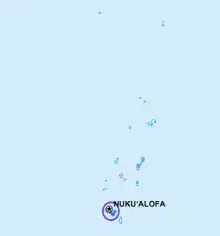| Tongan tooth-billed pigeon | |
|---|---|
| Scientific classification | |
| Domain: | Eukaryota |
| Kingdom: | Animalia |
| Phylum: | Chordata |
| Class: | Aves |
| Order: | Columbiformes |
| Family: | Columbidae |
| Genus: | Didunculus |
| Species: | †D. placopedetes |
| Binomial name | |
| †Didunculus placopedetes Steadman, 2006[1] | |
 | |
| Approximate distribution map prior to extinction
Year-round | |
The Tongan tooth-billed pigeon (Didunculus placopedetes), is an extinct species of pigeon that was endemic to Tonga that lived in the Quaternary period. A related species, the tooth-billed pigeon (Didunculus strigirostris), is the only known living species in its genus.[2]
Description
The Tongan tooth-billed pigeon is described as looking similar to its relative, the tooth-billed pigeon, although it was larger. The Tongan tooth-billed pigeon is only defined by subfossils found at archaeological sites. A common predator of the Tongan tooth-billed pigeon was the Barn Owl (T. a. lulu). It was about 31 to 38 centimetres long and weighed about 400 grams. with a short tail and a curved beak.[1]
Distribution and habitat
It was located on the Tongan islands of Tongatapu, Lifuka, Ha'ano, 'Uiha, and Ha'afeva[3] and lived in terrestrial environments. Its diet consisted of raw fruit of the Rhus taitensis. It also ate seeds from Heliconia laufao, nutmegs from the genus Myristica, tuber from species in the genus of Dioscorea, and berries.[1]
Extinction
The Tongan tooth-billed pigeon disappeared sometime after the colonization of the archipelago by humans, probably due to hunting, loss of habitat, and the influence of introduced invasive species.[4]
References
- 1 2 3 "An extinct species of tooth-billed pigeon (Didunculus) from the Kingdom of Tonga, and the concept of endemism in insular landbirds" (PDF). Florida Museum of Natural History. Retrieved 5 January 2023.
- ↑ "Didunculus placopedetes Steadman 2006". Fossilworks. Retrieved 5 January 2023.
- ↑ David W. Steadman (April 2015). "Avifauna from the Teouma Lapita Site, Efate Island, Vanuatu, Including a New Genus and Species of Megapode 1". ProQuest. Retrieved 5 January 2023.
- ↑ Hume, J.P.; Walters, M. (2012). Extinct Birds. London: T & AD Poyser. p. 116-117. ISBN 978-1-4081-5725-1.